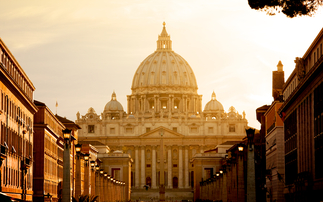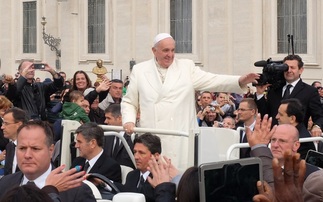Dr Kate Marvel's essay, 'We Need Courage, Not Hope, to Face Climate Change', may just provide the framing the climate movement needs
I've now read it three times, and the first impression stands. Dr Kate Marvel's essay, We Need Courage, Not Hope, to Face Climate Change, is one of the most powerful pieces you will read on climate change. It is urgent, vital, and beautiful. A review won't do it justice, you really should just read it.
It only takes five minutes, but packed into its 1,110 words are one of the most strikingly memorable explanations of the basic, unrelenting physics of our atmosphere; a hammer blow, emotional acknowledgement of the threat climate change poses to all we hold dear; and, just perhaps, the glimmer of a way forward. If you work in sustainability, have an interest in science communications, or just care about the future, you really must just read it.
And when you have read it - when you have soaked up Marvel's descriptions of human life "incandescent with the power of a hundred-watt bulb" and "dancing" carbon dioxide, her fear of how "we burn coal and oil and gas, heedless of the consequences", her admission "the world we once knew is never coming back", that we are "sending our children to live on an unfamiliar planet"- it is worth thinking about.
Because in the midst of an undeniably bleak essay, Marvel may just have hit on a means of resolving the dialectical tension between climate optimism and climate pessimism, and in the process identified a concept that could prove immensely useful to politicians, business leaders, and campaigners alike: climate courage.
I've written plenty in the past about the ways in which working on environmental issues is a constant battle to keep the joy and the fear in some sort of balance, and how a blunt climate optimism is tempting, but also problematic and risky. It is understandable that when addressing climate change politicians, CEOs, and campaigners all default to a fuzzy optimism, a sense that we can 'solve' or 'beat' or 'defeat' climate change which singularly fails to acknowledge how these verbs are pretty meaningless in the face of an existential, planetary scale physical phenomenon.
There are still good reasons to embrace this narrative, to relentlessly highlight the technologies and infrastructure and business models that could decarbonise the global economy and drive up living standards - I do it every day. But there is a constant risk this climate optimism, being built on the shakiest of foundations, becomes unbalanced, tips over into a naïve hope technology will save us - a hope that inevitable downplays the epic scale of the risks we face.
This perennial debate is getting an airing currently thanks to Steven Pinker's new book on the Enlightenment and accompanying essay on Enlightenment Environmentalism. Pinker offers a more nuanced take on climate optimism than most, citing the work of the economist Paul Romer and the crucial difference between complacent and conditional optimism. Complacent optimism is "the feeling of a child waiting for presents on Christmas morning", Pinker writes, while conditional optimism is "the feeling of a child who wants a treehouse and realizes that if he gets some wood and nails and persuades other kids to help him, he can build one". "We cannot be complacently optimistic about climate change, but we can be conditionally optimistic," he concludes. "We have some practicable ways to prevent the harms and we have the means to learn more. Problems are solvable."
This conditional optimism is entirely justified, but, for me, the way Pinker communicates on climate change, in writing and through interviews, fails to adequately express quite how conditional our optimism should be.
He may acknowledge climate change is the biggest challenge to his otherwise well-founded confidence in human progress, but he still fails to sound the alarm bell as loudly as is required in the face of a threat that could implode his entire hypothesis. His conditional optimism fails to adequately engage with the fact we have been collectively striving to create the conditions for greater optimism on climate change for over three decades, and yet global emissions are still not falling. It also fails to adequately highlight how the scale, reach, and pace of the low carbon industrial revolution that is now required is without historic precedent. All of which helps to explain why Pinker's optimism is so shamelessly purloined by a climate denialist tendency that does not fully understand it, just as it explains how the wider climate optimism narrative can inadvertently fuel a sense of complacency.
As Marvel puts it: "I have infinite, gullible faith in the goodness of the individual. But I have none whatsoever in the collective. How else can it be that the sum total of so many tiny acts of kindness is a world incapable of stopping something so eminently stoppable? … Change is already underway; individual worries and sacrifices have not slowed it."
The question then is how to respond when faced with an outlook so bleak, and it is here Marvel offers a profound break with the stale climate hope v despair debate. What we need, she argues, is courage. Her conclusion is worth quoting at length:
"I have no hope that these changes can be reversed. We are inevitably sending our children to live on an unfamiliar planet. But the opposite of hope is not despair. It is grief. Even while resolving to limit the damage, we can mourn. And here, the sheer scale of the problem provides a perverse comfort: we are in this together. The swiftness of the change, its scale and inevitability, binds us into one, broken hearts trapped together under a warming atmosphere.
"We need courage, not hope. Grief, after all, is the cost of being alive. We are all fated to live lives shot through with sadness, and are not worth less for it. Courage is the resolve to do well without the assurance of a happy ending. Little molecules, random in their movement, add together to a coherent whole. Little lives do not. But here we are, together on a planet radiating ever more into space where there is no darkness, only light we cannot see."
If climate optimism risks complacency and climate pessimism risks nihilistic inaction, what of climate courage?
Here is a narrative that resonates, one that acknowledges the full scale of the challenge and the necessity of facing it with all the nerve we can muster.
It also holds an intense psychological appeal. Who doesn't like the idea of being hailed for their courage? Who wants to be accused of cowardice in the face of crisis?
Here is a term that can galvanise climate action without simultaneously undermining it. A term that hints at the martial metaphor provided by the 'decarbonisation is like a war effort' narrative, but also extends to the small acts of courage we can all embrace in our own lives in the cause of the environment.
Most of all though, climate courage has the benefit of being true.
A few years back Apple's marketing chief Phil Schiller prompted some well-deserved mockery for explaining the reason the company was ditching the standard headphones port on its phones - a decision that resulted in plenty of resource inefficiency and e-waste, for what it is worth - with one ill-judged word: "courage". It does not take "courage" to change headphones, but to fundamentally and rapidly transform a business in response to climate change, in the face of fierce opposition and with no guarantee of success? That takes a little courage. To push through policies which may prove unpopular with the media and public, which could cost you your political career, but which are essential for a country's long term prosperity and security? That takes a little courage. To venture out into ever more intense storms or floods to help those in need? That takes more than a little courage.
Marvel's essay reminded me of another exceptional piece of writing on climate optimism by the US journalist David Roberts, who back in 2013 asked "is there any hope? Or are we just f*cked?" His conclusion was that climate action remains imperative for two undeniable reasons. Firstly, complex systems are "nonlinear" and can deliver unanticipated phase shifts - in other words, a miracle may might just turn up if we strive for it. And secondly, what else are we going to do? As Roberts concluded: "Remember, there is no 'too late' here, no 'game over' - it will be a tragedy to shoot past two degrees to three, but four is worse than three, and five is worse than four. Being unprepared for any of those will be much worse than being prepared. The future always forks; there are always better and worse paths ahead. There's always a difference to be made".
Making that difference depends not on reductive climate optimism or despairing climate pessimism. It depends on courage. It depends on "the resolve to do well without the assurance of a happy ending". Has there ever been a better description of the global project to tackle climate change than Marvel's beautiful turn of phrase? Again, you really must read it, and then muster what climate courage you can.










